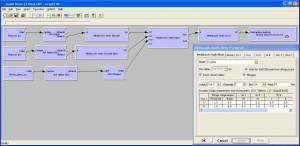Audio Mixer
(→Features) |
|||
| Line 1: | Line 1: | ||
| − | + | '''MediaLooks Audio Mixer''' is a DirectShow filter for real-time mixing of multiple audio streams. | |
| + | |||
==Overview== | ==Overview== | ||
| − | + | The Audio Mixer DirectShow filter is designed for mixing an arbitrary number of PCM streams in various combinations. | |
| + | |||
| + | For video mixing features please see our [[Video Mixer DirectShow Filter]]. | ||
==Features== | ==Features== | ||
[[Image:Audio-mixer.jpg|right|thumb|300px|2 stereo inputs are mixed into one mono output with a 30% decrease of volume.]] | [[Image:Audio-mixer.jpg|right|thumb|300px|2 stereo inputs are mixed into one mono output with a 30% decrease of volume.]] | ||
| − | |||
| − | |||
* Real-time mixing. | * Real-time mixing. | ||
Revision as of 17:17, 7 July 2007
MediaLooks Audio Mixer is a DirectShow filter for real-time mixing of multiple audio streams.
Contents |
Overview
The Audio Mixer DirectShow filter is designed for mixing an arbitrary number of PCM streams in various combinations.
For video mixing features please see our Video Mixer DirectShow Filter.
Features
- Real-time mixing.
- Unlimited number of stereo or mono input & output pins.
- Unlimited mixing flexibility: any input pin can be mixed to any output pin.
Input/output format: PCM Audio.
Future features
- Mixing of several input streams into one multichannel stream (WAVE-EX).
DirectShow filter specification
Audio mixer is a standard DirectShow filter.
Number of input pins >= 1 (new pin will be added after connection of all free input pins).
Number of output pins >= 1 (new pin will be added after connection of all free output pins).
Input/output media type: MEDIATYPE_Audio, MEDIASUBTYPE_PCM, FORMAT_WaveFormatEx.
Parameters of format:
WAVEFORMATEX: wFormatTag=WAVE_FORMAT_PCM
WAVEFORMATEX: nSamplesPerSec, wBitsPerSample: the same for all inputs/outputs.
WAVEFORMATEX: nChannels: 1 or 2 (mono or stereo). Can be different for different input/output pins.
Each input channel can be mixed with second channel of the same pin (for stereo inputs) or with any channel of another input pin (or several input pins). Input channels can be switched on another output pin in play time also (without graph stop).
Notes:
- All input frequencies should be identical (resampling not implemented in current version).
- After start of graph the media type of output pins cannot be changed (mono to stereo and vice versa).
The filter will have a COM interface and property page for set/get parameters of mixing (Input/channel -> Output/channel).
GraphEdit registration categories
You can see filter in GraphEdit:
DirectShow Filters -> MediaLooks AudioMixer MediaLooks Filters -> MediaLooks AudioMixer
GraphEdit usage instructions
Render two (or more) media files in GraphEdit. Connect uncompressed outputs to the inputs of the Audio Mixer and render one or more output pins (AM Out) of the Audio Mixer.
Open the property page of the Audio Mixer. The selector on the left shows the rendered output pins - if you have rendered only one one output pin, only "AM Out 01" is displayed.
The grid matrix on the right defines what is to be output to the selected output pin. Values from 0 (silence - in) to 1 (original level) are accepted. In the current version an empty field will also be treated as silence. If values higher than 1 are specified, the filter will work as an amplifier.
For editing the grid - either double click or press "Space" or "F2".
For example, if you have two input stereo streams and you wish to mix these streams in such a way that both of the input left channels are mixed to the right output channel and both input right channels - to the left, and at the same time decrease the volume of each channel by 30% - this is how your grid should look like.
Complementary components
- Audio (Video) delay filter
